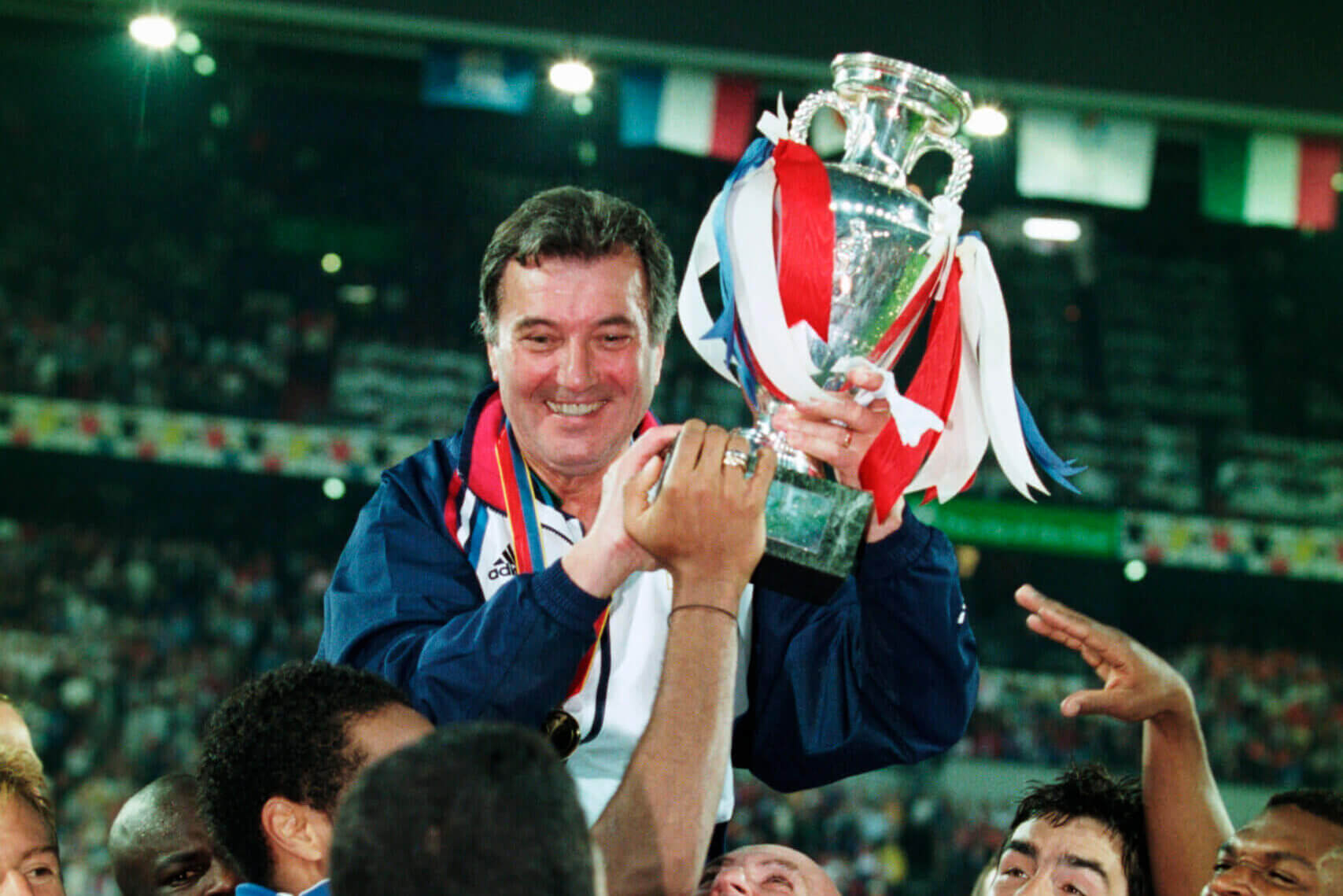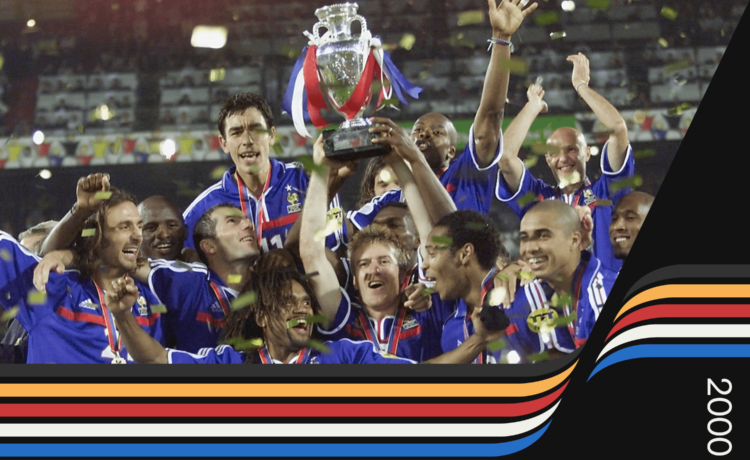This is the latest in our fortnightly series about the 16 triumphant teams in the European Championship before the 17th edition is played in Germany this summer.
We’ve looked at the Soviet Union in 1960, Spain in 1964, Italy in 1968, West Germany in 1972, Czechoslovakia in 1976, West Germany again in 1980, France in 1984, the Netherlands in 1988, Denmark in 1992 and Germany in 1996.
We’ve made it into the 21st century — it’s the turn of France in 2000.
Introduction
Going into Euro 2000, only one side had been European and world champions concurrently — West Germany, who followed European success in 1972 with a World Cup triumph in 1974. France became the second team to achieve that feat, doing things the other way around.
France were a much better side than in 1998, when they relied heavily on a strong defence, had to cope without Zinedine Zidane for part of the tournament because of suspension and desperately lacked a world-class striker. Here, the good form of Zidane and the transformation of Thierry Henry into a goalscoring machine made them a formidable attacking force. Key contributions from Robert Pires, Christophe Dugarry, Sylvain Wiltord and David Trezeguet also proved crucial. At this stage, that quartet were still playing in their homeland. France seemed to have a limitless supply of talent.

From left: Henry, Pires, Vieira (top), Trezeguet, Anelka and Wiltord celebrate with the Henri Delaunay Trophy (Tony Marshall/EMPICS via Getty Images)
Euro 2000 overall was exceptional — drastically different from the previous two tournaments in its focus on attacking play. You can make a good case for all four semi-finalists being better than the four semi-finalists from Euro ’96 and this tournament seemed to herald the beginning of a new era in football, based on imagination rather than caution.
You might be surprised to learn…
France very nearly failed to secure automatic qualification for Euro 2000. They stumbled through their qualification group, drawing 1-1 away at Iceland, needing a late winner from substitute Alain Boghossian to defeat Russia in Moscow, drawing 0-0 home and away with Ukraine, only beating Andorra and Armenia 2-0 each at home then 1-0 and 3-2 away, losing 3-2 at home to Russia, and then squeezing past Iceland 3-2 at the Stade de France.
All this meant that, if there had been a winner in the Russia vs Ukraine match in Moscow, either of those sides would have qualified automatically and France would have been forced into a play-off — but in a predictably tight game, Russia and Ukraine drew 1-1 with both goals coming from free kicks — the equaliser was an Andriy Shevchenko cross-shot that was almost chucked into the net by Russia goalkeeper Aleksandr Filimonov with two minutes remaining. If Filimonov had simply caught the ball, France would have been in the unseeded play-offs.
The manager
It feels like no one knows much about Roger Lemerre, which is peculiar considering he was the first man to win different continental international tournaments, following up this Euro 2000 success with an Africa Cup of Nations triumph with Tunisia in 2004.

Lemerre with the trophy in 2000 (Stephane Mantey/Corbis/VCG via Getty Images)
Lemerre, who won six French caps as a defender, had fairly unremarkable stints in charge of Paris’ Red Star, Lens, Paris FC and Strasbourg in the 1970s and 1980s, before spending a decade, somewhat unusually, in charge of the French army side until 1996. He then had a brief second spell at Lens and became assistant to Aime Jacquet for the World Cup 1998 win on home soil. When Jacquet left, Lemerre was his successor after Jean Tigana and Guy Roux were prevented from leaving by Monaco and Auxerre.
Arguably Lemerre’s most notable contribution to Euro 2000 was insisting on a boycott of all media activities for much of the first week, accusing newspapers of publishing lies and “breaking the link” between the team and fans. This was, no doubt, partly to create a siege mentality and wasn’t entirely unfamiliar for the French national side, but perhaps partly explains why there were relatively few profiles of Lemerre upon France’s success — he feels less prominent in his nation’s Euro success than any other manager of the modern era, with the focus on the world-class players at his disposal.
Tactics
Lemerre used two systems. The regular formation was a 4-2-3-1, with Zidane behind Henry, and Youri Djorkaeff and Dugarry floating inside from the flanks. They played more No 10s than wingers, so this was a side boasting plenty of creativity, and the width was more likely to come from Henry than them.
But on two other occasions, against the Czech Republic in the group stage and Portugal in the semi-final, Lemerre changed his approach completely and went for a 4-3-1-2. This featured Zidane behind two speedsters, Henry and Nicolas Anelka, and then three defensive midfielders — Didier Deschamps, Patrick Vieira and Emmanuel Petit. Deschamps, while often patronised as a ‘water carrier’ and compared unflatteringly to his Juventus colleague Zidane, was magnificent at the base of midfield. Lemerre begged him not to retire from international football afterwards but Deschamps’ race was run — less than a year later, he was appointed manager of Monaco.
Lemerre could also count upon one of the most impressive defences in European Championship history, at least on paper. Lilian Thuram, Marcel Desailly, Laurent Blanc and Bixente Lizarazu made up an incredibly solid quartet, although France only kept one clean sheet (in their first game, a 3-0 win over Denmark).
Here’s their system for the final.

Key player
Zidane. In a brilliant tournament where each of the four semi-finalists boasted a legendary No 10 — Francesco Totti, Dennis Bergkamp, Rui Costa — Zidane was magnificent throughout.
That was a slight surprise, as Zidane’s club form had been largely dreadful since winning the World Cup. In Juventus’ 1999-2000 Serie A campaign, he scored four goals, three of them from free kicks, and his only assist came 30 minutes into the opening game of a 34-game season — but this was the pattern of Zidane’s career, thriving in international tournaments despite difficult times at club level.
“Zidane is better now than he was two years ago,” said Pele. “He has more confidence to dictate a game as well as star in it…. whether he goes onto become one of the all-time greats is another matter. We’ll have to wait and see.”
🇵🇹🆚🇫🇷 When France legend Zinédine Zidane produced one of THE great EURO performances back in 2000 😍#EURO2020 | @FrenchTeam pic.twitter.com/7SGBSfst9e
— UEFA EURO 2024 (@EURO2024) November 30, 2019
Zidane scored a wonderful free kick in the quarter-final against Spain, then his performance in the semi-final against Portugal was particularly memorable, drifting to the flanks, constantly controlling awkward balls with grace and quickly changing direction when he was challenged. He also fired home the ‘golden goal’ penalty, conceded when Portugal defender Abel Xavier had blocked a goalbound shot. Inevitably, everything he did was compared to Michel Platini’s performance in Euro 1984 — Platini, too, had scored a free kick against Spain and a late semi-final winner against Portugal.
Zidane couldn’t quite match Platini with a starring performance in the final, initially playing high up the pitch in support of Henry, who was France’s best player on the night. A quicker player might have reached Henry’s low ball across the six-yard box to convert into an empty net. Later, he dropped back to battle in deeper positions when Lemerre introduced extra attackers, who proved crucial in France’s two goals.
Zidane’s major contributions in finals came in 1998 and 2006. His best overall tournament, though, was Euro 2000.
The final
Italy had reached the final through typically Italian play — their star performers had been centre-backs Alessandro Nesta and Fabio Cannavaro, with goalkeeper Francesco Toldo the best in the tournament, deputising for the injured Gianluigi Buffon. They were cast as the bad guys, the potential party poppers, trying to spoil a wonderful attack-minded tournament by winning with catenaccio.
That wasn’t entirely fair — Totti had his breakout tournament, for example — but Italy spent much of the time launching long balls hopefully for the workmanlike lone striker Marco Delvecchio.
France were in the unusual role of both bookmakers’ favourites and neutral’s favourites. They were the better side in the first half, largely because of Henry, who terrified Italy to the extent that Luigi Di Biagio and Cannavaro were booked for cynical fouls on him. Henry played the role of playmaker as much as finisher, drifting wide and dribbling dangerously, although this left France without anyone in the box.
Italy opened the scoring after the break, with Delvecchio turning in Gianluca Pessotto’s cross from the right, and they really could have wrapped things up on the counter, particularly through Alessandro Del Piero. Like his Juventus team-mate Zidane, Del Piero was enduring an (injury-induced) poor run of form, and was very much in between the two peaks of his career. He was twice played in behind, first by Totti and then by substitute Massimo Ambrosini. The first time, he shot tamely wide, and the second time, he shot tentatively, straight at Fabian Barthez.
Lemerre threw on three attackers in a desperate attempt to find an equaliser. Trezeguet played as a target man, Wiltord offered speed and Pires provided width down the right. After a long ball was flicked on by Trezeguet, Wiltord fired home from a tight angle underneath Toldo — a clear mistake from the goalkeeper who, had Italy held on, might have been voted the tournament’s best player.
The defining moment
Sometimes, a side are 1-0 down and pushing everything into attack, and you get the sense that if they manage to find an equaliser, they’ll almost certainly score a winner too. Rarely has that sense been as strong as in this match.
Having already used up three substitutions on three forwards, Lemerre had no choice but to keep on attacking. And after Wiltord, his first substitute, had equalised, the other two combined for the winner. Pires had been introduced as a left-sided attacker in place of Lizarazu, and essentially played as a left-back in extra time. His mazy run down the left was followed by a measured pull-back, which allowed Trezeguet to crash a brilliant left-footed drive into the top of the net. There have been sensational Euros-winning goals over the years, but this is up there with the best.
EURO 2000 🏆
Score winning goal in the final ✅🇫🇷 David Trezeguet 👏#OTD | @FrenchTeam | @Trezegoldavid pic.twitter.com/aruUaqWMDA
— UEFA EURO 2024 (@EURO2024) January 28, 2020
It was the second straight final decided by a golden goal, after Oliver Bierhoff’s winner at Wembley four years beforehand. Coincidentally, both were substitute strikers wearing No 20.
Trezeguet had recently agreed to move to Italy, signing for Juventus. Six years later, he would effectively decide another France vs Italy final — he was the only player to miss a penalty in the World Cup 2006 final shootout. His kick crashed against the underside of the bar — it was probably only around six inches higher than this shot that won Euro 2000.
Were they the best team?
Yes, among stiff competition from co-hosts the Netherlands, who were eliminated by Italy on penalties in the semi-final. “No previous European Championship has demonstrated such a high technical level,” read World Soccer magazine. “France deserved to win because they were the finest team. From the moment they started showboating in their first game against Denmark, they looked a class act.”
They’re up there with the best European Championship winners — although, at the same time, they’re not the best French European Championship winners.
Lemerre was bold about his side. “This is a victory for attacking football,” he said. “I’m not going to pretend otherwise.”
(Top photo: Philippe Hugen/AFP via Getty Images)



















